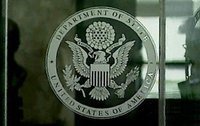US top officials show ridiculous reactions to Russian elections
 Hardly had Russia summed up the results of the parliamentary vote, which took place in the country on December 4, when the US State Department hurried to express its concerns. We could not do without Senator John McCain, of course. He also made some remarks about the Russian elections, after he read a newspaper article.
Hardly had Russia summed up the results of the parliamentary vote, which took place in the country on December 4, when the US State Department hurried to express its concerns. We could not do without Senator John McCain, of course. He also made some remarks about the Russian elections, after he read a newspaper article.
US Secretary of State Hillary Clinton was the first of US officials to react. She set out her concerns about the procedure of elections in Russia. Afterwards, the head of the US foreign policy department stated that independent observers were not allowed to observe the course of elections.
"The Russian people, like people everywhere, deserve the right to have their voices heard and their votes counted. And that means they deserve free, fair, transparent elections and leaders who are accountable to them," she said Tuesday as ministers gathered for a meeting of the Organization for Security and Cooperation in Europe.
Russia is supposed to take measures on the base of recommendations from OSCE observes, Clinton said. Ms. Clinton obviously knows that the OSCE mission was not the only foreign delegation which observed the vote. Other observers did not have serious claims.
Why do the Russian authorities have to do what the absolute minority of observers tells them to do? Does any other opinion count?
The Russian people will find out for themselves what they deserve. They do not need a piece of advice for that from Ms. Clinton. Opposition meetings took place after the election in Moscow and St. Petersburg. As for the meeting in Moscow, one may say that the action of the liberal opposition activists attracted a lot of people indeed. Two thousand people is an "achievement," especially if there are over 7 million electors in Moscow.
Human rights activists from Amnesty International rushed to support those who were arrested during the meeting. Usually, the actions organized by the Russian opposition do not attract so much attention. For example, Amnesty paid attention to Boris Nemtsov only days after his imprisonment (for 15 days). We have to say that the followers of Eduard Limonov and leftist radicals also held their actions on December 4. Some of them were arrested too, but Western human rights activists did not pay any attention to that.
Barack Obama's press secretary Jay Carney made an official statement regarding the concerns of the US administration about the Russian parliamentary elections. Senator John McCain followed next. The senator read an article on The WSJ about the election results in Russia and then tweeted: "Dear Vlad, the Arab Spring is coming to a neighborhood near you."
Senator McCain has been expecting that to happen to months. One should not be expecting anything relevant from the senator.
Adequate US politicians realize that the events similar to those in Egypt (on Tahrir Square) are not possible in Russia. One may blog and blog about it, but nothing is going to happen anyway.
The attempts to use the elections to achieve some goals look more likely, though. For example, scientist of politics Konstantin Simonov said that the above-mentioned reactions from US officials were predictable.
"There is nothing surprising about it, especially now when Russia and the US differ on a number of issues again - the missile defense issue and Syria, for example," he said.
It is quite possible that the attempts to put pressure on Russia after the elections will become another issue for Washington's foreign policies. They may simply use those who disagree with the results of the vote. This is nothing special, it's only business.
Oleg Artyukov
Pravda.Ru
Subscribe to Pravda.Ru Telegram channel, Facebook, RSS!





